|
What does a Barrel of Oil Make:
The Breakdown for oil processed in California is:
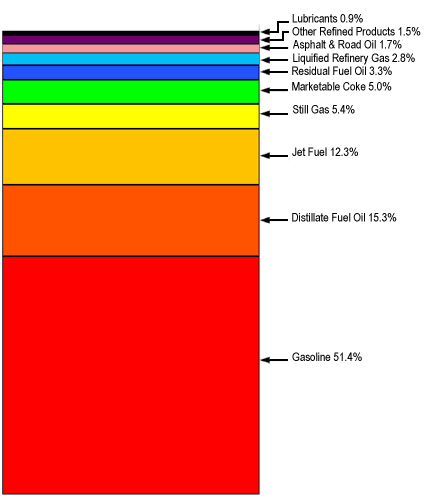
image from energy.ca.gov
In Europe, the Pacific, and North America the percentages are different:
(There is less gasoline refined, and more diesel)
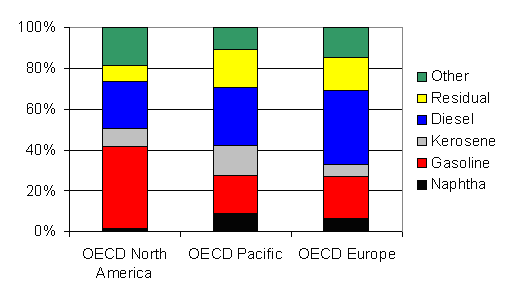
image from energy.gov
There are different views on when the oil reserves will be depleted:
Most experts believe production will reach its maximum around 2020, and the supply will decrease, ultimately expiring in the second half of the 21st Century. This is a composite graph of several different graphs of projected oil production.
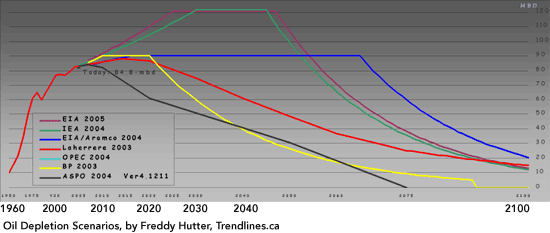
The Hubbert graph shows that non-OPEC production has already peaked:
More on the Hubbert Peak Theory here
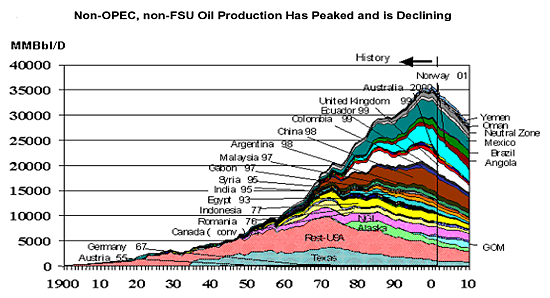
source
Industrialized nations consume much more of the worlds' energy resources:
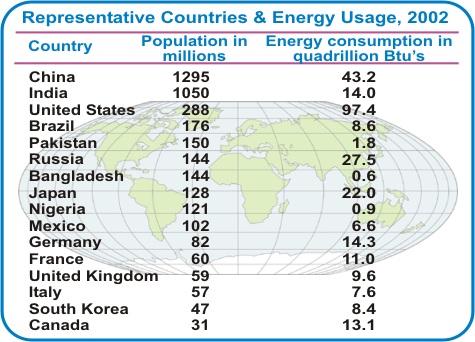
source
|

|
Oil Facts
Oil is the single largest component of the U.S. trade deficit.
source
The U.S. Strategic Petroleum Reserve holds 675 million barrels of oil. This is enough oil to offset imports for 57 days.
source
Though a barrel of oil contains 42 gallons, the refining process produces 44.7 gallons of distillate. The extra 2,7 gallons are called "process gain" and comes from a reduction in the density of the fluids during the refining process
source
Experts estimate that there are 1,000 billion barrels of oil remaining on our planet.
source
Current world wide oil consumption is 30 billion barrels per year.
source
Experts predict that oil production will peak around 2025, and that we will run out of oil sometime in the end of the 21st century.
source
The United States, Mexico, China, Norway, Canada, and the United Kingdom are all past their peak oil production
source
Oil composes 42% of U.S. energy consumption; the other sources are coal (24%), natural gas (20%), nuclear (8%), hydro-power (2%), and wind and solar (2%).
source
The United States has 5% of the global population, and uses 25% of the global energy resources.
source
The United States produces 1/3 of the oil it consumes, and imports the remaining 2/3.
source and source
The largest oil producing countries in the world are: (figures in million barrels per day) Saudi Arabia (OPEC): 10.37, Russia: 9.27, United States: 8.69, Iran (OPEC): 4.09, Mexico: 3.83, China: 3.62, Norway: 3.18, Canada: 3.14, and Venezuela (OPEC) 1: 2.86
source
The U.S. produces 5.4 Million barrels of oil per day. The major oil producing U.S. states are Texas (1.07 million barrels per day), Alaska ( 908,000 barrels per day), California (656,000 barrels per day), Louisiana (226,000 barrels per day), and New Mexico (176,000 barrels per day).
source
The U.S. imports 10,088,000 barrels/day. 5,042,000 barrels/day come from OPEC countries. The top U.S. Crude Oil Supplier is Canada, with 1,616,000 barrels/day
source
|